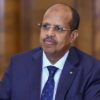WASHINGTON, November 16 – Signs coming out of Barack Obama’s transition conclave in Chicago suggest he has no intention of lowering his sights for an activist, big ideas, presidency despite the deep economic crisis.
Since Obama’s historic election nearly two weeks ago, some analysts have suggested that the financial crunch, huge budget deficits and two draining wars abroad will curtail Obama’s ambitious sweeping reform agenda.
But Obama’s approach to framing his administration, frequent campaign trail allusions to activist presidents of the past and possible cabinet picks may signal he views the crisis not as a constraint, but an opportunity.
In an overt sign of bipartisanship, the president-elect is set to meet former Republican foe John McCain on Monday.
He is mulling whether to name big beasts of the political jungle like Hillary Clinton and Bill Richardson as secretary of state.
And his pick for chief of staff, sharp-elbowed Rahm Emanuel has a reputation as a man of action, who can get things done in Washington.
"Even as we dig ourselves out of this recession, we must also recognize that out of this economic crisis comes an opportunity to create new jobs, strengthen our middle class, and keep our economy competitive in the 21st century," Obama said in his weekly radio address on Saturday.
He then reeled off a plan to put two million Americans to work rebuilding crumbling roads, bridges, and schools and an initiative to invest 150 billion dollars in a green energy economy to create another five million jobs.
"It means making health care affordable for anyone who has it, accessible for anyone who wants it, and reducing costs for small businesses.
"And it also means giving every child the world-class education they need to compete with any worker, anywhere in the world."
Obama’s ambitious plans have drawn comparison to the massive New Deal public works programs pioneered by Democratic president Franklin D. Roosevelt who took office in the eye of an economic storm in 1933.
The president-elect has also signalled support for a new economic stimulus package and aid for ailing US automakers.
Leon Panetta, former chief of staff for president Bill Clinton, said Obama’s first task — stabilizing the economy could win him political capital to enact his wider agenda.
"This president has to put his stamp on the economy. That’s first and foremost," he said at a post-election forum at the Brookings Institution.
"He’s got to be successful at that. If he’s successful at that, at getting something done with regard to the economy, then he gains the credibility to be able to then work on other issues."
Obama is plotting a fast start after his inauguration on January 20.
Aides said last week they were studying a sheaf of possible executive orders — effectively decrees by a president to change the law.
The new president could quickly overhaul climate change policy for instance, and even close the controversial ‘war on terror’ camp at Guantanamo Bay, Cuba.
Obama’s meeting with Clinton in Chicago on Thursday night ignited a flurry of speculation and jawing among the pundit classes.
The fact that the president-elect is even considering political figures like Clinton, in a possible "team of rivals" cabinet like that of his political hero Abraham Lincoln hardly suggests a presidency of minimal ambition.
Democratic gains have also positioned Obama to push a wide agenda through Congress — his party will control the White House and Capitol Hill for the first time in 14 years.
With three seats still undecided in the Senate, the Democrats look set to fall short of the 60-seat supermajority needed to overcome Republican obstruction tactics.
But some Republican senators face tough reelection battles in normally conservative states that Obama won in the November 4 election and may not be keen to be seen as thwarting the new president’s agenda.
Senator Judd Gregg in New Hampshire for instance has just seen his Senate colleague John Sununu tumble to a Democrat.
On one of the most vexing issues healthcare reform, there is already a sign of movement in Congress.
Democratic Senator Max Baucus from Montana has already revealed his reform plan, reportedly after consulting Obama aide and former Senate majority leader Tom Daschle.
Another key Obama supporters, ailing Democratic lion Senator Edward Kennedy has also sent signals that he is ready to unveil his own plan, in what may be valedictory legislation of a storied political career.














































